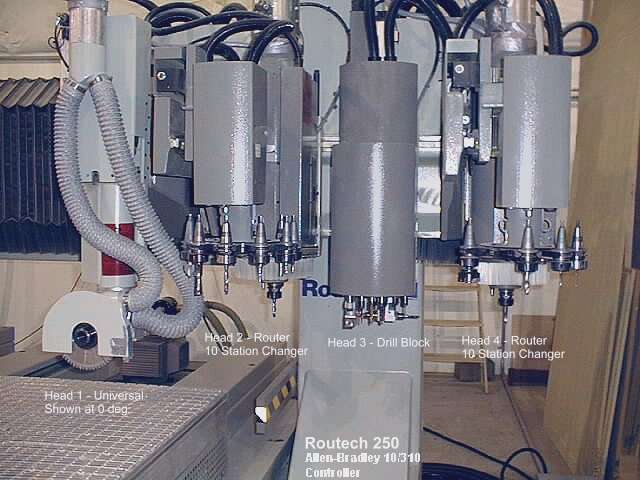|
This is a 5 axis machine equipped with:
2 ea. 12 HP Router Heads w/10 Station Rotary Changers.
Universal Head, Using a saw blade or standard tooling
Universal has Non-Rollover 'A' axis with 0-270º range
Drilling Block w/8 Vertical and 4 Horizontal Spindles
Dual 5' x 5' Vacuum Tables
Air-Cooled, 350 CMH, 800 mB Vacuum Pump
Why Allen-Bradley/Osai?
As a programmer, I've had the opportunity to work with and learn
about a number of different controllers. Of all that I have seen, by
far and away the A-B 10/310 has the best implementation of
programming tools available. By that I mean, the commands
to allow you to loop, jump, compare, count, etc. This is of great
benefit when it comes to producing maximum programs using
minimum code. All the standard 'modes' are all available such as
incremental, absolute, mirrored, etc. It also has multiple variable
types to use as you see fit. This includes local, global, static, flags
and string. Properly utilized, these elements allow you to produce
some of the most efficient and productive code I have ever seen
used on a CNC Router. This controller also features 'tables' to contain
your tool offsets, origins, and variables. These are also accessible in
the context of a program. This is quite different from most of the
others I've seen. There are three levels of origins, which are hierarchal
in nature, meaning you can 'stack' offsets on top of each other while
maintaining all your original origins. You can build paramacros and
assign G codes to them so you can 'make up your own' as you see fit.
Things like axis swaps, working face changes, etc. are as simple as
issuing a G310, for example. You can conditionally execute subroutines,
subprograms, or turn blocks of code on or off within your programs.
Combining all that I have described above, makes for a rich and
flexible programming environment. It's apparent that Rockwell borrowed
heavily from the PC world of programming when they wrote the
specifications for this controller. I, for one, am very glad they did.
|


